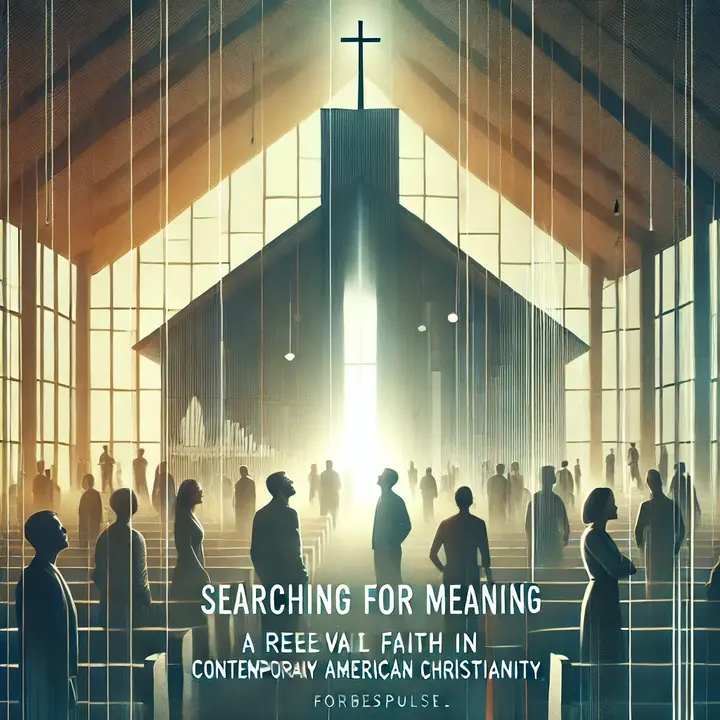I. Introduction
In recent years, American Christianity has faced a reckoning, as many individuals seek a meaningful Christianity that resonates with their lived experiences. With the decline of traditional church attendance and the rise of diverse belief systems, people are left grappling with what it means to have a relevant faith in a rapidly changing world.
The question arises: How can individuals cultivate a spiritual journey that aligns with both their values and the pressing issues of our time? This article explores the search for faith that speaks to the heart of contemporary life, reflecting on the historical context of Christianity in America while delving into modern movements that seek to redefine what it means to be a Christian today.
II. Historical Context of American Christianity
To understand the current landscape of American Christianity, it is crucial to examine its historical roots. The journey of Christianity in America began with the arrival of European settlers, who brought their faith with them, seeking religious freedom and a new beginning. Early movements such as Puritanism emphasized strict moral codes and community governance, laying the foundation for many contemporary beliefs.
The Great Awakening of the 18th century marked a significant turning point, igniting a wave of revivalism and emotional spirituality. This movement emphasized personal faith experiences and challenged established religious norms, paving the way for the rise of evangelicalism in the 19th century. Churches began to prioritize individual conversions and grassroots evangelism, which attracted many who sought a more direct relationship with God.
As American society evolved, so did the practice of Christianity. The Civil Rights Movement in the 1960s saw many faith leaders, such as Martin Luther King Jr., advocating for social justice through a Christian lens. This intersection of faith and activism highlighted the potential of Christianity in contemporary culture to address pressing societal issues.
However, as the years progressed, a divide emerged between traditional teachings and the evolving values of a diverse society. Today, many individuals feel disconnected from the rigid structures of conventional worship, prompting a search for a modern Christianity in America that aligns with their beliefs and experiences.

III. Current Trends in American Christianity
As we navigate the 21st century, American Christianity is experiencing significant transformations. One notable trend is the decline in traditional church attendance. Many people, particularly younger generations, are moving away from established denominations in search of spiritual fulfillment that feels more authentic and relevant. This shift has led to the rise of non-denominational churches and alternative spiritual communities that prioritize inclusivity and personal experience.
In addition to this decline, there is an increasing interest in progressive Christian communities that advocate for social justice and environmental stewardship. These groups often focus on living out their faith through action, addressing issues like poverty, racism, and climate change from a scriptural perspective. This movement reflects a growing desire among many believers to connect their faith with real-world problems, demonstrating that Christianity and modern life can coexist harmoniously.
Moreover, the rise of digital platforms has made it easier for individuals to explore diverse theological perspectives and connect with like-minded communities. Online sermons, podcasts, and social media groups have become essential resources for those seeking a more meaningful Christianity that speaks to their concerns and aspirations.
However, this landscape is not without its challenges. The fragmentation of faith communities often leads to a sense of isolation among those who feel they don’t fit into traditional molds. Many are left asking: How do I find a faith community that resonates with my values? This search is crucial as people yearn for deeper connections, both with each other and with their understanding of God.
Image: A contemporary Christian gathering that showcases diversity and engagement in modern faith practices.
IV. The Search for Meaning
In today’s complex world, many individuals find themselves on a journey to discover a relevant faith that resonates with their personal experiences and challenges. The search for faith has become a vital aspect of modern spirituality, as people seek to reconcile their beliefs with the realities of contemporary life.
One major challenge is the disconnect between traditional teachings and the pressing societal issues that many encounter daily. For instance, individuals who have grown up in American Christianity may find themselves struggling with questions surrounding social justice, inclusion, and environmental concerns. Traditional church doctrines often fall short of addressing these topics in a meaningful way, leading many to feel disillusioned or disconnected from their faith.
Personal stories abound of those who have left traditional church settings in search of something more profound. For example, a millennial might recount how their faith community failed to address the realities of systemic racism or climate change, prompting them to seek out progressive Christian communities that actively engage in advocacy and action. These individuals are looking for a faith that not only speaks to their spiritual needs but also aligns with their values and the challenges they witness in the world.
Moreover, the isolation often felt in these spiritual quests can lead to a sense of loneliness. Many are left questioning: Where do I belong? How can my faith be both personal and communal? The longing for connection is strong, as is the desire to find a faith community that genuinely embodies the principles of love, acceptance, and social responsibility.
The quest for a meaningful Christianity is ultimately about more than just individual beliefs; it’s about fostering community and support among those who share similar values and experiences. By engaging with others on this journey, individuals can cultivate a deeper understanding of what faith can mean in a rapidly changing society.

V. Defining a Relevant Faith
As individuals embark on their search for faith, it becomes crucial to define what constitutes a meaningful Christianity in today’s world. A relevant faith is one that resonates with the lived experiences of individuals and aligns with contemporary societal values. Here are some key characteristics that define this evolving understanding of Christianity:
- Inclusivity and Diversity: A relevant faith embraces individuals from all backgrounds, ethnicities, and orientations. Many progressive Christian communities prioritize inclusion, recognizing that everyone deserves a place at the table, regardless of their past or identity. This approach challenges traditional barriers that have often excluded marginalized groups.
- Engagement with Social Issues: A meaningful Christianity actively engages with pressing social issues, such as poverty, systemic racism, and climate change. Many individuals are looking for ways to live out their faith through activism, advocating for justice and compassion in their communities. This connection between faith and social responsibility is a vital aspect of a relevant Christian practice.
- Community and Relationships: Building authentic relationships is central to a relevant faith. Many individuals are seeking congregations that prioritize community over ritual. These faith communities foster genuine connections, encouraging members to support one another in their spiritual journeys and everyday lives.
- Personal Spiritual Practices: A relevant faith encourages individuals to cultivate personal spiritual practices that resonate with their experiences. This might include meditation, prayer, artistic expression, or engaging with nature. By fostering personal connections to the divine, individuals can explore what spirituality means to them in a way that feels authentic.
- Open Dialogue and Questioning: A meaningful faith welcomes questions and doubts, allowing individuals to explore their beliefs without fear of judgment. Many are seeking spaces where they can wrestle with complex theological issues, including the role of faith in addressing modern challenges.
Examples of churches and movements that embody these principles include:
- The Emergent Church Movement: This movement seeks to reimagine what it means to be a Christian in today’s context, focusing on community and dialogue.
- Social Justice Ministries: Many congregations actively engage in community service, advocating for systemic change while integrating their faith with activism.
By embracing these characteristics, individuals and communities can redefine their understanding of Christianity in contemporary culture, creating a faith that is vibrant, relevant, and deeply connected to the issues of our time.
VI. The Intersection of Faith and Social Justice
The intersection of faith and social justice is becoming increasingly significant in the landscape of modern American Christianity. As individuals seek a meaningful Christianity, many are discovering that their spiritual beliefs can inform and motivate their engagement with social issues. This relationship highlights the potential for faith communities to be powerful agents of change in society.
- Historical Foundations: The roots of social justice within Christianity can be traced back to biblical teachings that advocate for the marginalized and oppressed. Figures such as Martin Luther King Jr. exemplified how faith can drive social change, using scripture to inspire movements for civil rights and equality. His work serves as a reminder that Christianity in contemporary culture can actively confront injustice and promote compassion.
- Modern Advocacy: Today, many faith-based organizations are at the forefront of social justice initiatives. These organizations address various issues, including:
- Poverty alleviation: Churches and ministries often engage in programs that provide food, shelter, and resources for those in need.
- Environmental justice: Many Christians advocate for sustainability and stewardship of the earth, recognizing that caring for the planet is a spiritual responsibility.
- Racial equality: Faith communities are increasingly addressing systemic racism, working to dismantle barriers that have long oppressed marginalized groups.
- Case Studies of Impact: Numerous faith communities have successfully integrated social justice into their missions. For example:
- Sojourners: This organization blends faith with social justice, advocating for policies that support the poor and marginalized.
- The United Methodist Church’s “Rethink Church” Campaign: This initiative encourages congregations to engage in community service and activism, promoting a faith that acts in love.
- Challenges and Conversations: While many Christians are eager to engage in social justice efforts, challenges remain. Conversations about race, poverty, and environmental issues can be sensitive and divisive. Faith communities must navigate these discussions with grace, seeking to unite rather than divide.
- The Call to Action: Individuals seeking a relevant faith are encouraged to explore how they can integrate their beliefs with social justice efforts. This may involve volunteering, advocating for change, or simply educating themselves about the issues at hand. By actively participating in these efforts, they can embody a meaningful Christianity that reflects love, justice, and compassion.
The intersection of faith and social justice illustrates that a relevant faith is not just about personal beliefs; it’s about embodying those beliefs in the world and making a tangible impact on the lives of others.

VII. Practical Steps for Individuals and Communities
As the quest for a relevant faith continues, individuals and communities can take tangible steps to cultivate a meaningful Christianity that aligns with their values and addresses contemporary issues. Here are some practical approaches to fostering this relevant spiritual journey:
- Seek Out Inclusive Communities: Look for churches and faith groups that prioritize inclusivity and diversity. Engage with congregations that actively promote social justice, welcoming people from all walks of life. Many progressive churches are committed to creating environments where everyone feels valued and heard.
- Engage in Active Dialogue: Foster open discussions about faith, doubt, and social issues within your community. Encourage members to share their thoughts and questions, creating a safe space for exploration. These conversations can lead to deeper understanding and unity among diverse perspectives.
- Participate in Service Projects: Get involved in local outreach initiatives that address community needs. Volunteering at shelters, food banks or environmental clean-up efforts allows individuals to live out their faith in practical ways, demonstrating the connection between spirituality and action.
- Educate Yourself and Others: Take the time to learn about pressing social issues and the role of faith in addressing them. Books, podcasts, and documentaries can provide valuable insights into topics like racial justice, poverty, and environmental stewardship. Share this knowledge within your community to inspire collective action.
- Advocate for Change: Engage in advocacy efforts that align with your beliefs. This might include writing letters to legislators, participating in peaceful protests, or supporting organizations dedicated to social justice. By using your voice and resources, you can contribute to meaningful change.
- Cultivate Personal Spiritual Practices: Explore personal spiritual practices that resonate with your understanding of faith. This may include prayer, meditation, journaling, or engaging with nature. These practices can deepen your connection to the divine and provide a foundation for your spiritual journey.
- Build Relationships: Focus on building authentic relationships within your community. Foster connections with others who share your values, creating a network of support as you navigate your faith journey together. Community is essential for maintaining encouragement and accountability.
- Reflect and Reassess: Regularly reflect on your faith journey. Ask yourself what aspects of your spirituality resonate with you and what changes you might need to make. Be open to evolving your beliefs and practices as you seek a deeper connection to your faith.
By actively pursuing these steps, individuals and communities can cultivate a meaningful Christianity that addresses the complexities of modern life. This journey is about more than personal belief; it’s about embodying faith in action and contributing to a more just and compassionate world.
VIII. Conclusion
The quest for a relevant faith in American Christianity is an ongoing journey that reflects the complexities of contemporary life. As individuals grapple with their spiritual beliefs, many are seeking a meaningful Christianity that resonates with their values and addresses the pressing issues of our time.
Throughout this exploration, we have seen how the historical context of American Christianity informs modern practices, and how current trends reveal a desire for inclusivity and engagement with social justice. By embracing characteristics such as community, open dialogue, and personal spiritual practices, individuals and congregations can redefine their understanding of faith to create a vibrant and relevant expression of Christianity.
As we move forward, it is essential to recognize that the search for meaning in faith is not a solitary endeavor. Each individual contributes to a larger tapestry of spirituality that emphasizes love, justice, and compassion. By engaging with one another, challenging traditional norms, and advocating for change, we can cultivate a Christianity in contemporary culture that is both dynamic and transformative.
In this journey, remember that you are not alone. Many others are seeking to connect their faith with the world around them, striving to live out the principles of inclusivity and social responsibility. Let this article serve as an encouragement to continue exploring your own faith journey, and to foster connections with those who share your values.
Together, we can shape a meaningful Christianity that meets the needs of today’s society, promoting love, justice, and understanding for all.

